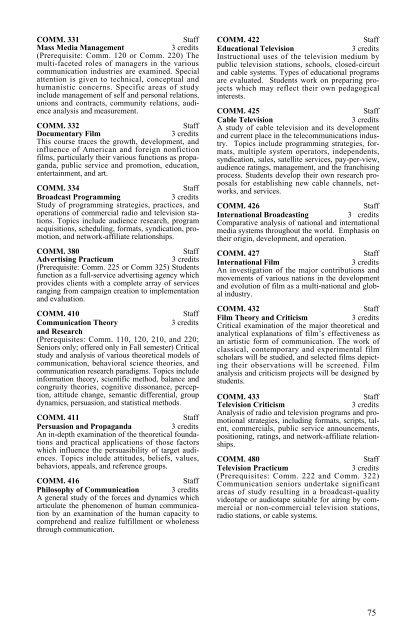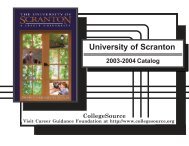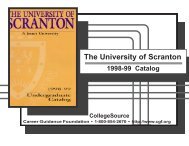You also want an ePaper? Increase the reach of your titles
YUMPU automatically turns print PDFs into web optimized ePapers that Google loves.
COMM. 331 Staff<br />
Mass Media Management 3 credits<br />
(Prerequisite: Comm. 120 or Comm. 220) <strong>The</strong><br />
multi-faceted roles <strong>of</strong> managers in the various<br />
communication industries are examined. Special<br />
attention is given to technical, conceptual and<br />
humanistic concerns. Specific areas <strong>of</strong> study<br />
include management <strong>of</strong> self and personal relations,<br />
unions and contracts, community relations, audience<br />
analysis and measurement.<br />
COMM. 332 Staff<br />
Documentary Film 3 credits<br />
This course traces the growth, development, and<br />
influence <strong>of</strong> American and foreign nonfiction<br />
films, particularly their various functions as propaganda,<br />
public service and promotion, education,<br />
entertainment, and art.<br />
COMM. 334 Staff<br />
Broadcast Programming 3 credits<br />
Study <strong>of</strong> programming strategies, practices, and<br />
operations <strong>of</strong> commercial radio and television stations.<br />
Topics include audience research, program<br />
acquisitions, scheduling, formats, syndication, promotion,<br />
and network-affiliate relationships.<br />
COMM. 380 Staff<br />
Advertising Practicum 3 credits<br />
(Prerequisite: Comm. 225 or Comm 325) Students<br />
function as a full-service advertising agency which<br />
provides clients with a complete array <strong>of</strong> services<br />
ranging from campaign creation to implementation<br />
and evaluation.<br />
COMM. 410 Staff<br />
Communication <strong>The</strong>ory 3 credits<br />
and Research<br />
(Prerequisites: Comm. 110, 120, 210, and 220;<br />
Seniors only; <strong>of</strong>fered only in Fall semester) Critical<br />
study and analysis <strong>of</strong> various theoretical models <strong>of</strong><br />
communication, behavioral science theories, and<br />
communication research paradigms. Topics include<br />
information theory, scientific method, balance and<br />
congruity theories, cognitive dissonance, perception,<br />
attitude change, semantic differential, group<br />
dynamics, persuasion, and statistical methods.<br />
COMM. 411 Staff<br />
Persuasion and Propaganda 3 credits<br />
An in-depth examination <strong>of</strong> the theoretical foundations<br />
and practical applications <strong>of</strong> those factors<br />
which influence the persuasibility <strong>of</strong> target audiences.<br />
Topics include attitudes, beliefs, values,<br />
behaviors, appeals, and reference groups.<br />
COMM. 416 Staff<br />
Philosophy <strong>of</strong> Communication 3 credits<br />
A general study <strong>of</strong> the forces and dynamics which<br />
articulate the phenomenon <strong>of</strong> human communication<br />
by an examination <strong>of</strong> the human capacity to<br />
comprehend and realize fulfillment or wholeness<br />
through communication.<br />
COMM. 422 Staff<br />
Educational Television 3 credits<br />
Instructional uses <strong>of</strong> the television medium by<br />
public television stations, schools, closed-circuit<br />
and cable systems. Types <strong>of</strong> educational programs<br />
are evaluated. Students work on preparing projects<br />
which may reflect their own pedagogical<br />
interests.<br />
COMM. 425 Staff<br />
Cable Television 3 credits<br />
A study <strong>of</strong> cable television and its development<br />
and current place in the telecommunications industry.<br />
Topics include programming strategies, formats,<br />
multiple system operators, independents,<br />
syndication, sales, satellite services, pay-per-view,<br />
audience ratings, management, and the franchising<br />
process. Students develop their own research proposals<br />
for establishing new cable channels, networks,<br />
and services.<br />
COMM. 426 Staff<br />
International Broadcasting 3 credits<br />
Comparative analysis <strong>of</strong> national and international<br />
media systems throughout the world. Emphasis on<br />
their origin, development, and operation.<br />
COMM. 427 Staff<br />
International Film 3 credits<br />
An investigation <strong>of</strong> the major contributions and<br />
movements <strong>of</strong> various nations in the development<br />
and evolution <strong>of</strong> film as a multi-national and global<br />
industry.<br />
COMM. 432 Staff<br />
Film <strong>The</strong>ory and Criticism 3 credits<br />
Critical examination <strong>of</strong> the major theoretical and<br />
analytical explanations <strong>of</strong> film’s effectiveness as<br />
an artistic form <strong>of</strong> communication. <strong>The</strong> work <strong>of</strong><br />
classical, contemporary and experimental film<br />
scholars will be studied, and selected films depicting<br />
their observations will be screened. Film<br />
analysis and criticism projects will be designed by<br />
students.<br />
COMM. 433 Staff<br />
Television Criticism 3 credits<br />
Analysis <strong>of</strong> radio and television programs and promotional<br />
strategies, including formats, scripts, talent,<br />
commercials, public service announcements,<br />
positioning, ratings, and network-affiliate relationships.<br />
COMM. 480 Staff<br />
Television Practicum 3 credits<br />
(Prerequisites: Comm. 222 and Comm. 322)<br />
Communication seniors undertake significant<br />
areas <strong>of</strong> study resulting in a broadcast-quality<br />
videotape or audiotape suitable for airing by commercial<br />
or non-commercial television stations,<br />
radio stations, or cable systems.<br />
75
















